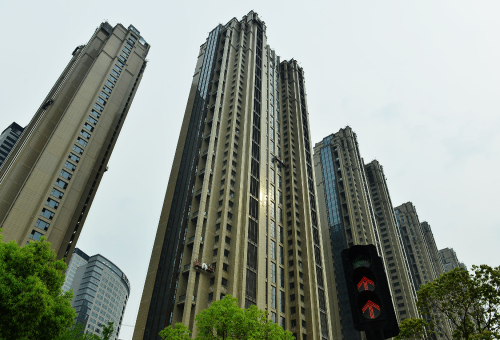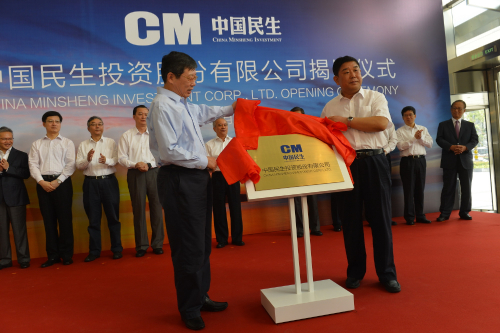|
 |
|
A residence commodity in Hangzhou, capital of east China's Zhejiang Province. Local authorities adjusted the home purchase limit policy on July 28 (LONG WEI) |
Property Market Slump
Following years of strong performance, China's property market has shown signs of cooling down. Prices have been dropping, sales have slowed, new construction has dropped off sharply and banks have become increasingly cautious about lending to developers and home buyers.
China's restrictive home purchasing policies, which had been in place since 2010 to curb the overheating property sector, was altered amid negative market sentiment. In 2014, many cities removed or loosened their home purchase bans in the sluggish property market. A total of 46 Chinese cities had imposed bans on the purchase of a third home in efforts to curb speculation in the market. Now, only five cities—Beijing, Shanghai, Guangzhou and Shenzhen in Guangdong Province and Sanya in Hainan Province—still maintain the ban.
On September 30, the People's Bank of China (PBC) and the China Banking Regulatory Commission (CBRC) relaxed lending rules for home buyers, allowing banks to offer a maximum 30-percent discount to firsttime home buyers, a group that has been expanded to include those who already own one property but have paid off their mortgage. In a bid to promote liquidity within the property market, the PBC and CBRC also encouraged banks and financial institutions to free up home loans by issuing mortgage-based securities.
 |
|
Quan Zhezhu (right), Executive Vice President of All-China Federation of Industry and Commerce, and Yang Xiong (left), Mayor of Shanghai, unveil the nameplate for China Minsheng Investment Corp. Ltd. on August 21 (CFP) |
Private Financial Institutions
In 2014, profound progress has been made in opening traditionally monopolistic sectors to private capital. In late July, the CBRC declared the approval of three new banks wholly funded by private firms, echoing the pilot scheme for setting up private banks announced in March this year.
The three banks are located in the Qianhai Economic Zone in south China's Guangdong Province; Wenzhou, east China's Zhejiang Province; and Tianjin, a northern port city, respectively. The CBRC approved the operation of the Qianhai-based Webank on December 12.
On August 21, China Minsheng Investment (CMI), the largest private investment company in China, was set up to spearhead the country's industrial upgrade. CMI pledged to use the accumulated private investment to build an industrial and financial conglomerate. CMI plans to establish nine subsidiaries to help ease the problem of overcapacity, a chronic headache for steel, photovoltaic power generation and shipbuilding industries.
 |
|
Han Zheng (second right), Party Chief of Shanghai, and Xiao Gang (first right), Chairman of the China Securities Regulatory Commission, beat a gong to commemorate the start of the Shanghai-Hong Kong Stock Connect at the Shanghai Stock Exchange on November 17 (CHEN FEI) |
Capital Market Reform
Reform on China's capital markets has been expedited this year. The State Council issued a guideline on May 9 promoting the development of the capital market, including an array of principles regarding the stock market, bond market, futures market, private equity market and further opening up the capital market. The guideline pledged to build a transparent, efficient, open and inclusive multi-layer capital market system by 2020.
The Shanghai-Hong Kong Stock Connect program, which allows mainland and Hong Kong investors to trade shares on each other's bourses, was launched on November 17, boding well for the opening up of China's capital markets.
On November 28, Zhang Xiaojun, spokesman of the China Securities Regulatory Commission, said a draft plan to reform the nation's stock issuance regime had been completed and would be presented to the State Council for review. Under the plan, China will switch to a registration-based system for new share listing from the current approval-based system.
 |
|
An Audi-branded car is shown at an international auto show in Beijing in April (CFP) |
Anti-Trust Campaign
China resolved to stringently enforce its anti-monopoly law, no matter the origin of the offender. This year, China launched wave after wave of anti-trust probes in a broad range of industries covering all types of businesses—state-owned enterprises (SOEs), private businesses and foreign-funded firms.
China's regulatory authorities commenced anti-monopoly probes into Qualcomm, Microsoft, Mercedes, Audi, BMW and Japanese auto part makers in a wave of high-profile cases. On September 11, the FAW-Volkswagen Sales Co. was fined 248.58 million yuan ($40.13 million), with seven dealers of its luxury brand, Audi, fined 29.96 million yuan ($4.84 million). The same day, Chrysler Group China Sales Ltd. was fined 31.68 million yuan ($5.11 million), with three of its dealers being fined 2.14 million yuan ($345,500).
On the other side of the equation, law enforcement departments have been equally tenacious in pursuing domestic firms that have violated the law. In early September, three Chinese cement companies were fined 114 million yuan ($18.5 million) in total for manipulating prices and reaching price-fixing agreements. The same month, 23 Chinese insurance firms and the Zhejiang Insurance Industry Association were fined more than 110 million yuan ($17.8 million) for anti-trust violations.
|
